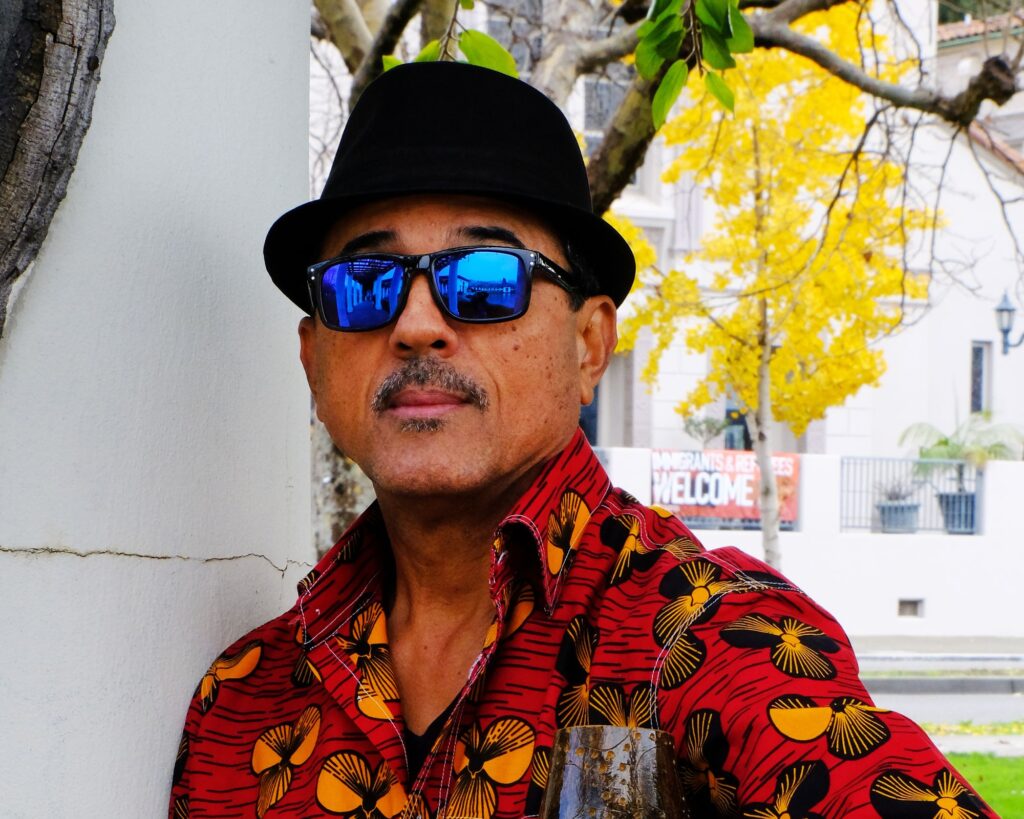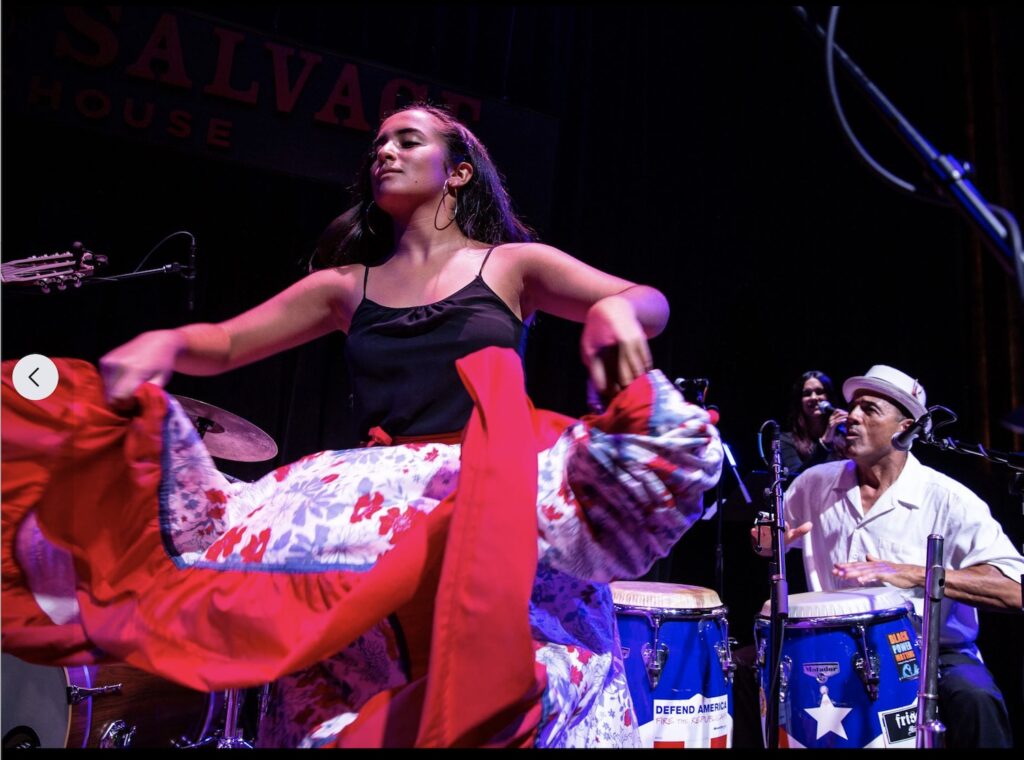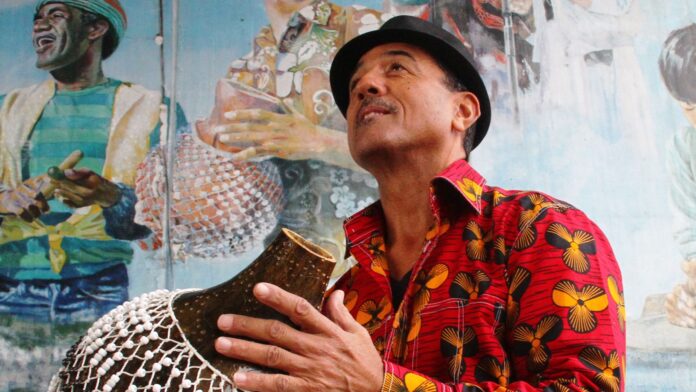The conservation of Afro-Caribbean music and culture has become John Santos’s life mission.
Growing up in San Francisco’s Mission District in the late ’60s and early ‘70s, he was steeped in classical Puerto Rican and Cape Verdean influences. Rising Bay Area artists like Carlos Santana, Pete Escovedo, and Sheila E. represented Latin sounds—and Santos could see the threat of their erasure from rising gentrification.
As he began releasing a stream of critically acclaimed albums on his Machete Records label starting in 1984, he worked to preserve the seminal sounds and forms by infusing them into his contemporary work.
Between the 7x Grammy nominee’s records and tours and collaborations with the likes of Tito Puente, Dizzy Gillespie, and Santana—he also took time to educate others about the Afro-Caribbean, Cuban, and Puerto Rican traditions behind his beats.
Through his classes at California Jazz Conservatory, SF State University, and College of San Mateo, the “keeper of the Afro-Caribbean flame steeped in Cuban and Puerto Rican folkloric traditions,” teaches students that to fully appreciate Latin jazz’s rhythmic lexicon, one has to understand the historical context that gave rise to its foundational grooves.

The SFJAZZ trustee and Oaktown Jazz Advisory Board member is drumming his point home with a new four-part online lecture/demonstration series (starting August 30) in partnership with San Francisco’s Museum of the African Diaspora.
Called “Rhythms of Resistance,” each pay-what-you-can socio-historical session focuses on the traditional and contemporary roles of Puerto Rican and Cuban music and rhythms in the struggle for social justice.
I spoke to Santos about how growing up in the Mission informed his career, bridging the gap between artistic expression and working-class social reality, and challenging gentrification, racism, and classism in his work—while fighting to remain in the Bay Area.
Help us save local journalism!
Every tax-deductible donation helps us grow to cover the issues that mean the most to our community. Become a 48 Hills Hero and support the only daily progressive news source in the Bay Area.
48 HILLS How did growing up in the Mission inform your musical career?
JOHN SANTOS By exposing me deeply to an amazing music scene that included jazz, funk, blues, soul, rock ‘n’ roll, the inception of Latin rock, and the progressive movement of solidarity among countries and communities seeking social justice and equality.

48 HILLS Why teach a course like “Rhythms of Resistance”?
JOHN SANTOS Because the information is historical and essential to understanding the urgent connections between artistic expression and working-class social reality with its inherent struggles. Also, it generally is not taught in regular academic institutions.
48 HILLS Who is this course suitable for?
JOHN SANTOS It is perfect for those seeking a more accurate perspective on Cuban and Puerto Rican music and culture than that which is commonly understood.
48 HILLS What is the connection between the African diaspora and the Puerto Rican-Cuban art forms you practice?
JOHN SANTOS The PR and Cuban art forms I practice are among the countless forms that exist throughout the Americas that all share a common colonial history. They are at once representative of resistance, survival, and documentation in the voices of the documented.
48 HILLS What are some things you can share about the social and cultural history of the music and rhythms that most people don’t know?
JOHN SANTOS That Latin American roots are among the most important in the history and evolution of our national art form, jazz. That the birthplace of jazz, New Orleans, is intimately connected for several centuries to all the other major ports of the Caribbean basin economically, geographically, and culturally. That Afro-Latinidad is an essential element of American pop culture.
48 HILLS What are the traditional and contemporary roles of Puerto Rican and Cuban music in the struggle for social justice?
JOHN SANTOS They are the same—frontline expression of working-class communities in transition and under siege.
48 HILLS You’re described as a “keeper of the Afro-Caribbean flame steeped in Cuban and Puerto Rican folkloric traditions.” What does this mean to you?
JOHN SANTOS I look at it as a challenge to not let gentrification, racism, or classism erase our very American identities.
48 HILLS How do you expand Latin jazz’s rhythmic lexicon beyond the foundational Cuban grooves?
JOHN SANTOS My work honors traditions while incorporating creativity, fusion, and inter-generational collaboration.
48 HILLS What’s coming up for you outside of this course?
JOHN SANTOS The 66th Monterey Jazz Festival on September 23 where my Sextet will perform and the documentary film about my work, SANTOS—SKIN TO SKIN, will be screened.
48 HILLS What keeps you in the Bay Area as opposed to moving to a more major music city?
JOHN SANTOS I had to move out of my hometown, San Francisco, in 1980 because of rising costs. I was in Colma for 10 years and in Oakland now since 1991. The absurd economic state of our country ensures that I will never be able to move to a “more major” city.
RHYTHMS OF RESISTANCE Wed/30, and September 6, 13, and 20. Tickets and more info here.






